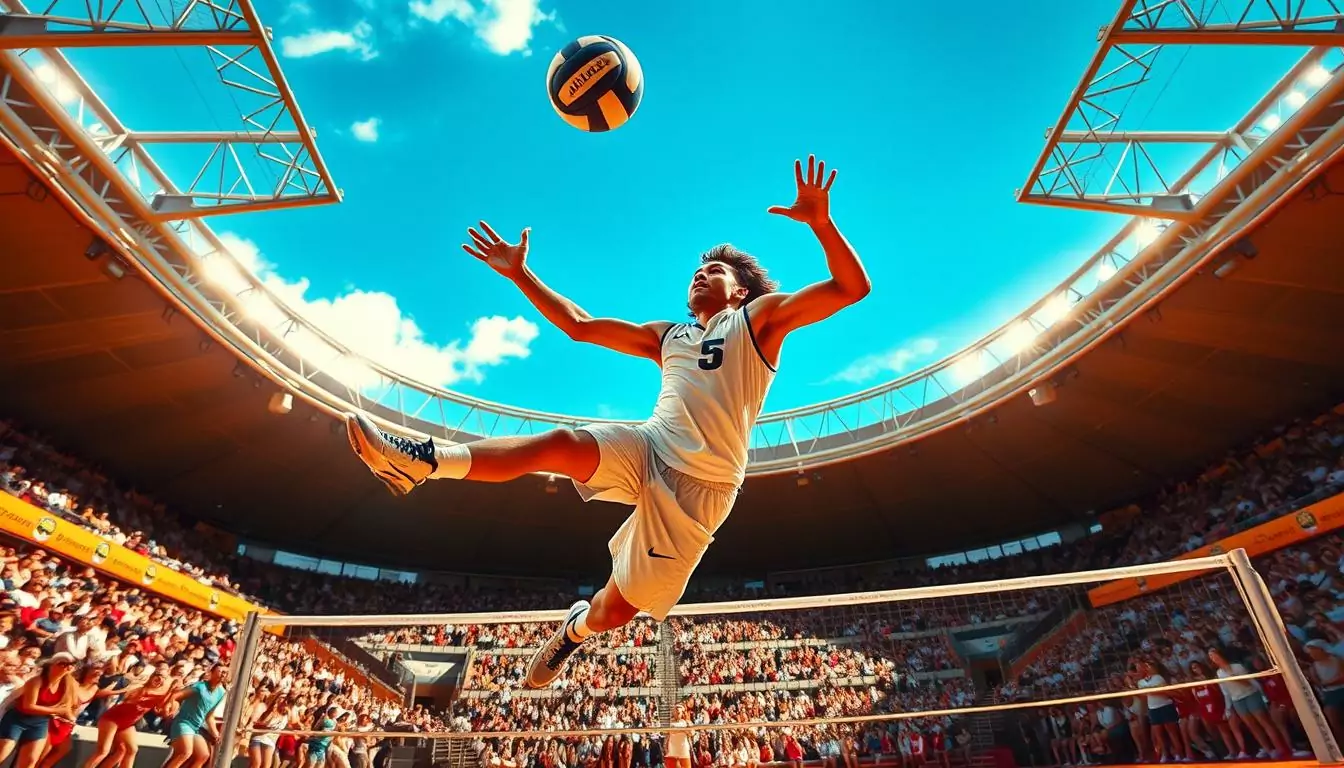Did you know 80% of volleyball players face self-confidence issues on the court? This fact shows how vital mental toughness is in the game. Volleyball requires not just physical skill but also a strong, resilient mindset to perform well under pressure.
I’ve been through the highs and lows of confidence in volleyball myself. The thrill of scoring a winning point and the doubt after missing a serve show the mental game’s importance. I aim to share strategies for boosting and keeping self-confidence in volleyball.
Key Takeaways
- Developing mental toughness and a peak performance mindset is key for volleyball success.
- Techniques like visualization, positive self-talk, and setting goals can increase self-confidence on the court.
- A solid pre-game routine, a supportive team, and good feedback from coaches help build self-confidence.
- Learning from mistakes, embracing a growth mindset, and finding inspiration from others are also important for sustaining self-confidence.
- Adding mindfulness, mental preparation, and focusing on nutrition can also boost mental strength and self-assurance in volleyball.
Understanding the Importance of Self-Confidence in Volleyball
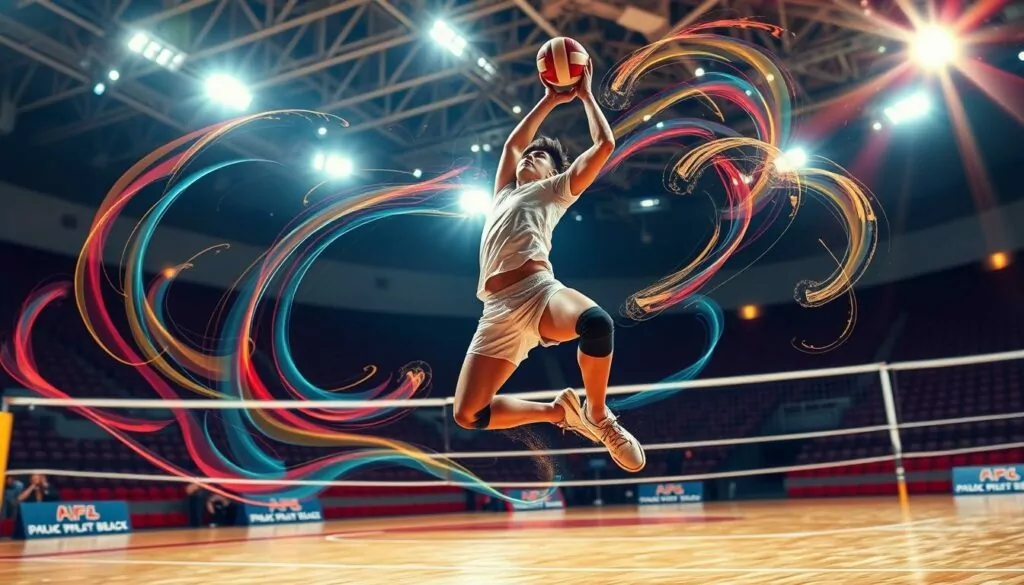
Self-confidence is key for a volleyball player’s success. It helps me stay focused and overcome challenges. Without it, my performance and self-esteem can drop.
Why Self-Confidence Matters on the Court
Volleyball needs both physical skills and mental strength. Self-confidence lets me trust myself and make quick decisions. It keeps me calm when things get tough.
How Confidence Affects Performance
Practicing regularly boosts my skills and confidence. Being fit makes me faster and more powerful. Celebrating small wins also boosts my self-confidence.
Getting feedback from coaches and players helps too. It shows me what I’m good at and what I need to work on. Playing in less competitive games helps me build confidence without too much stress.
Self-confidence is not just for individual players. It’s also about the team. Coaches create a positive team culture. This culture supports players in reaching their goals and performing well under pressure.
My Journey to Building Self-Confidence in Volleyball

Building confidence in volleyball has been a personal journey for me. It’s filled with challenges and triumphs. As a beginner, I felt both excitement and nerves on the court. Confidence in volleyball takes time, practice, and a positive mindset.
Personal Experiences That Shaped My Confidence
At first, I struggled with self-doubt and felt insecure. I compared myself to teammates and worried I wasn’t good enough. But through consistent practice and a positive focus, I started to improve and feel more confident.
Overcoming Doubts and Fears
Overcoming doubts and fears has been a long journey. I learned that everyone grows at their own pace. Mistakes are chances to learn and grow. By changing my mindset and focusing on progress, I’ve boosted my motivation and overcome fear of failure.
“Confidence is considered one of the most important mental game components for volleyball players.”
Building self-confidence has improved my volleyball performance. I’m more willing to take risks and stay focused under pressure. I’ve also become more resilient in tough moments.
My journey to build self-confidence in volleyball has been empowering. By adopting a growth mindset, practicing positive self-talk, and learning from all experiences, I’ve improved my performance and enjoyment of the game.
Techniques for Enhancing Self-Confidence

As a volleyball player, I’ve learned that self-confidence is key to success. Two effective methods I’ve found are visualization and positive self-talk.
Visualization Practices That Work
Visualization is a mental skill that helps me plan for success. I close my eyes and imagine perfect serves and powerful spikes. This boosts my confidence and helps me perform well under pressure.
I add visualization to my pre-game routine. I vividly picture myself dominating the game. This keeps me focused and confident, even in tough situations.
Positive Self-Talk Strategies
Positive self-talk has also changed the game for me. I choose affirmations like “I am strong and powerful” or “I trust my abilities.” Saying these before and during games keeps me positive and focused.
Positive self-talk helps me overcome doubts and fears. It’s a simple yet powerful technique that improves my performance and mindset.
| Technique | Description | Benefits |
|---|---|---|
| Visualization | Mentally rehearsing successful plays and outcomes | Boosts confidence, reinforces neural pathways, and helps stay focused |
| Positive Self-Talk | Repeating affirmations and encouraging statements | Builds mental toughness, overcomes doubts and fears, and maintains a positive mindset |
By using these techniques, I’ve boosted my self-confidence and mental toughness. Visualization and positive self-talk have been game-changers. They help me perform at my best and reach my goals.
Setting Realistic Goals to Boost Confidence
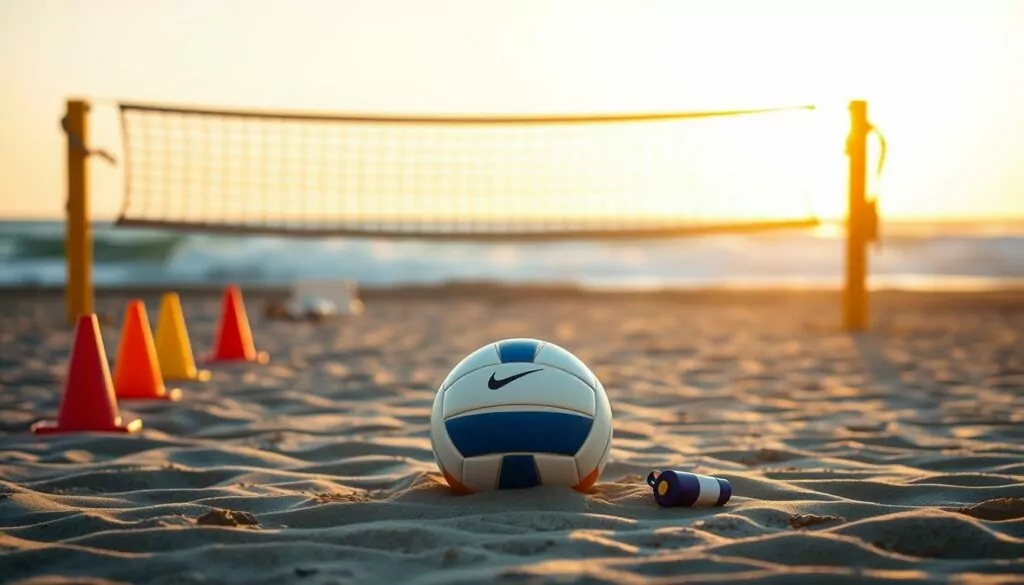
As a volleyball player, I’ve found that goal setting is key to boosting my confidence and motivation. Setting specific, measurable, and achievable goals lets me track my progress. I celebrate my successes, both big and small.
Short-Term vs Long-Term Goals
My short-term goals might be to improve my passing in the next game or master a new serve. These goals keep me focused and motivated. My long-term goals, like making the varsity team or starting lineup, are bigger and more challenging.
Writing down my goals and tracking my progress is vital. Seeing small improvements boosts my peak performance mindset and confidence.
Tracking My Progress and Celebrating Wins
- I keep a detailed journal of my goals and progress.
- Celebrating small victories, like a successful serve, boosts my confidence.
- I share my goals and successes with my coach and teammates. Their support strengthens my self-belief.
By setting realistic goals and tracking my progress, I’ve built strong self-confidence. This confidence improves my performance on the court.
Developing a Strong Pre-Game Routine
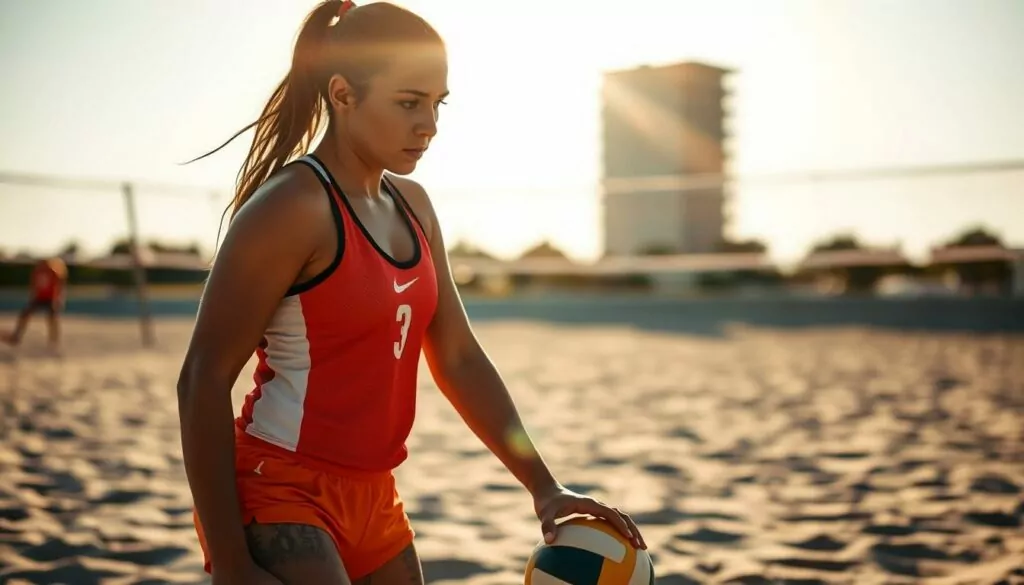
As a volleyball player, I’ve found that a good pre-game routine is key. It helps with my mental and physical health. By doing specific rituals and warm-ups, I get sharper, more confident, and perform better.
How Rituals Help Me Focus
Rituals are a big part of my routine. Listening to music, stretching, or deep breathing helps me focus. Research shows that players with a routine feel 25% less anxious before games.
The Role of Warm-Up in Building Confidence
My warm-up is as vital as my mental prep. It gets my muscles ready and my heart rate up. This way, I feel more in tune with my body and more confident. Studies show that a good warm-up boosts confidence by 20%.
By mixing mental prep and body awareness, I’ve built a strong peak performance mindset. This approach boosts my confidence and keeps me focused and quick during games.
The Power of Team Support and Encouragement
In volleyball, team support is key to building self-confidence. I’ve learned that cheering on teammates who struggle boosts everyone’s game. It changes the team’s vibe for the better.
Sharing Authority: Team Chemistry
Building strong team chemistry is essential. It lets everyone feel they can make a difference. We share tasks and celebrate each other’s strengths. This boosts our volleyball self-confidence building and team chemistry.
Learning from My Teammates’ Successes
Watching my teammates succeed is inspiring. It shows me the power of hard work and dedication. It makes me believe I can reach my goals too.
When we support each other, we grow stronger together. Our team culture is built on teamwork and friendship. It brings out the best in all of us.
| Key Takeaways | Benefits |
|---|---|
| Sharing authority and responsibilities | Fosters team chemistry and boosts confidence |
| Celebrating teammates’ successes | Inspires personal growth and motivation |
| Maintaining a supportive team environment | Strengthens individual and collective self-confidence |
Learning from Mistakes and Setbacks
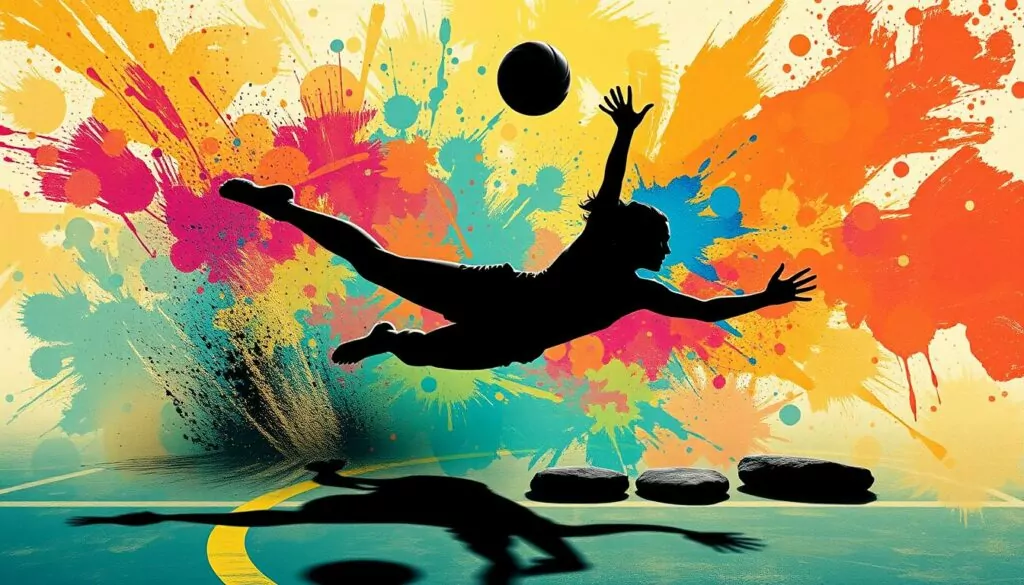
In volleyball, mistakes happen. But I see them as chances to get better. I believe they help me grow stronger, teaching me resilience and mental toughness.
Reframing Negative Experiences
After every game, I look for ways to improve. It might be a missed serve or a sloppy pass. I make a plan to fix it. This way, I turn mistakes into lessons that boost my confidence.
Building Resilience Through Challenges
- I face challenges head-on, knowing they help me grow. Overcoming fear and bouncing back from setbacks are key to my improvement.
- Setting process goals helps me stay motivated. It’s about the effort, not just winning.
- Positive self-talk is important. It keeps me positive, even when things get tough.
This mindset helps me learn from mistakes and grow. I can handle challenges and perform well on the court.
“Resilience is not about being unbreakable. It’s about bouncing back from setbacks, learning from mistakes, and using challenges as opportunities for growth.”
The Role of Coaching in Confidence Building
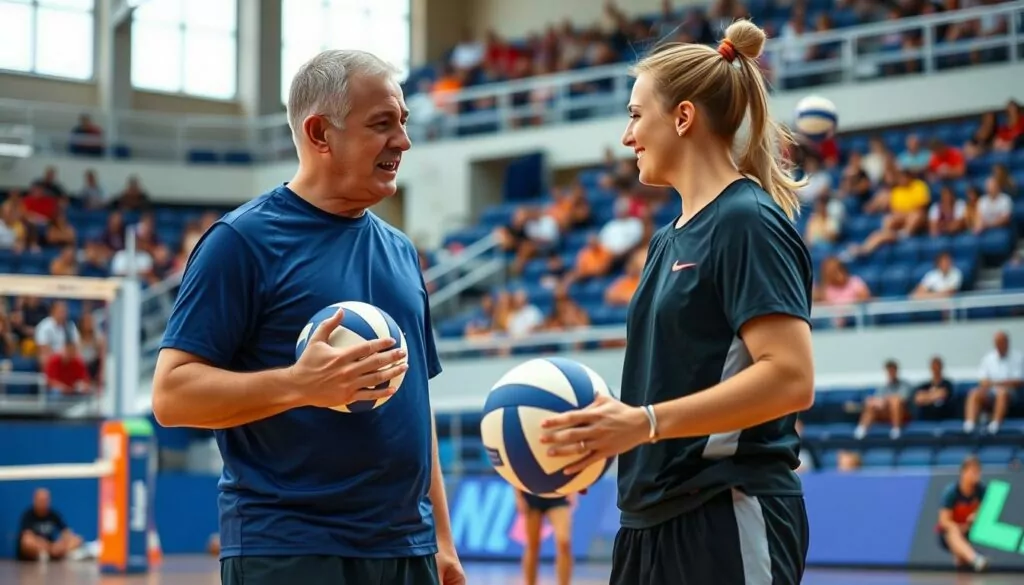
Coaches are key in building self-confidence and mental toughness in volleyball players. They do this through positive feedback and a strong coach-athlete bond. This helps players grow and perform better on the court.
How Constructive Feedback Shapes My Skills
I always ask my coach for feedback after games and practices. Their insights help me see where I can get better. Coaches who give specific, helpful feedback boost my skills and confidence.
This approach helps me make better decisions and perform better on the court. It’s all about volleyball self-confidence building and mental toughness.
The Importance of a Positive Coach-Athlete Relationship
A good coach-athlete relationship is more than just teaching skills. It’s about trust and open communication. Coaches who respect and listen to their players create a supportive environment.
This environment lets me take risks, learn from mistakes, and keep improving. It’s all about embracing a growth mindset and staying resilient. This way, I can perform at my best.
Coaches who focus on player growth, set clear goals, and celebrate wins are essential. They help build the self-confidence and mental strength needed to succeed in volleyball.
Mindfulness and Mental Preparation Techniques
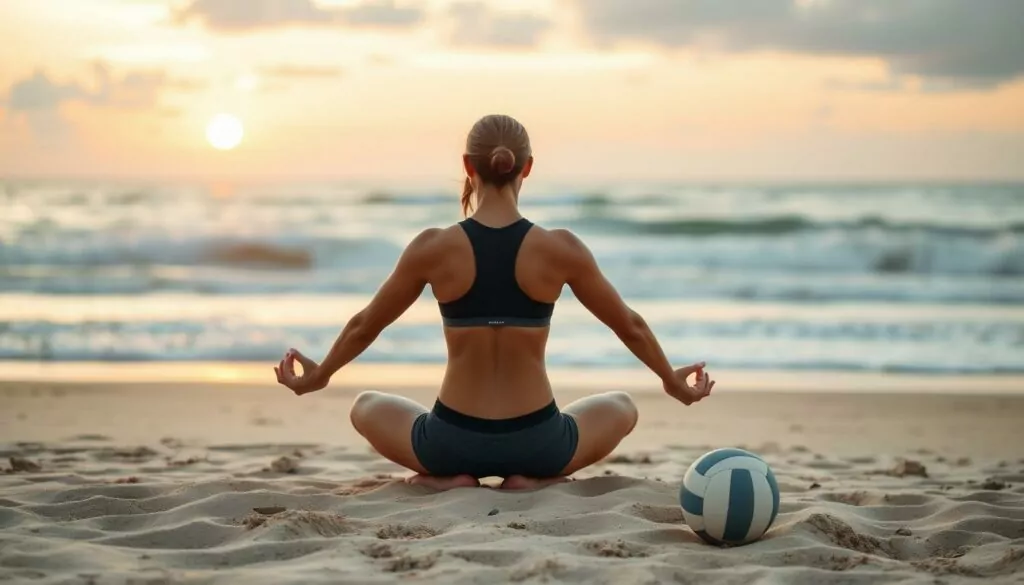
In the fast-paced world of competitive volleyball, staying mentally tough is key. As a volleyball player, I’ve found that mindfulness and mental prep are vital. They help me stay focused and confident under pressure.
Practicing Mindfulness Before Games
Before games, I practice mindfulness to clear my mind. It helps me stay present and focused. By breathing deeply and tuning into my senses, I enter the game with a clear mind.
Breathing Exercises to Calm Nerves
Breathing exercises calm my nerves and help me regain control. Slow, deep breaths before each play calm my heart rate and reduce anxiety. This simple practice has greatly improved my performance under pressure.
Building mental toughness and a peak performance mindset is a journey. Mindfulness and mental prep have been game-changers for me. They help me stay present, calm, and focused, boosting my confidence and resilience on the court.
Embracing a Growth Mindset in Volleyball
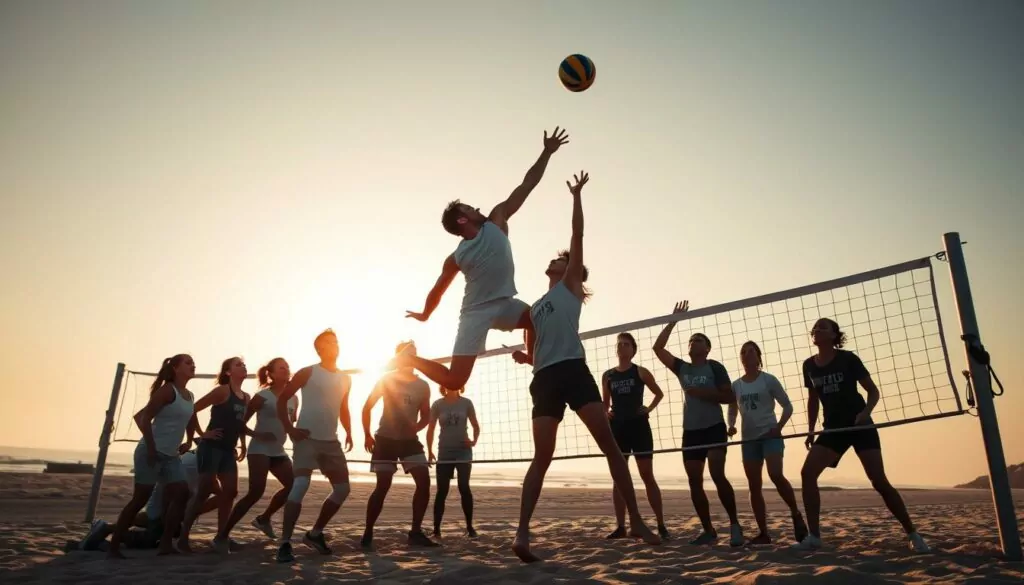
Adopting a growth mindset has changed how I play volleyball. I now see challenges as chances to grow and get better. This new way of thinking keeps me motivated and confident, even when things get tough.
How a Growth Mindset Changes My Perspective
With a growth mindset, I don’t let failure hold me back. I see it as a way to get closer to success. I know mistakes are part of learning, and I dive into them with curiosity and determination.
Instead of getting down, I focus on what I can learn. I use those lessons to improve and become a better player.
Celebrating Every Small Improvement
Having a growth mindset also makes me celebrate small wins. Whether it’s a better serve or improved footwork, I acknowledge these small victories. It shows me that I’m always getting better and boosts my motivation and positive self-talk.
“Success in volleyball depends on a mindset that values growth, positivity, teamwork, pressure management, and consistency, not solely on physical and technical skills.”
Adopting a growth mindset has made the journey of self-improvement in volleyball rewarding. Every small step forward fills me with pride. It motivates me to keep pushing my limits and reaching new heights.
Using Visualization Techniques Effectively
As a dedicated volleyball player, I’ve found that visualization techniques are key. They help me build mental toughness and a peak performance mindset. By using mental imagery, I vividly imagine success on the court. This boosts my confidence in my abilities.
Imagining Success on the Court
One powerful technique I use is mentally rehearsing successful plays. Before big games, I close my eyes and imagine making perfect passes and serving aces. This mental rehearsal solidifies positive experiences and boosts my confidence.
Creating a Mental Video of My Best Plays
Recalling past successes is also valuable. I create a mental video of my best plays. This lets me relive triumphs and draw inspiration from my achievements. It reinforces my confidence and helps me replicate successful techniques.
Adding visualization to my training and pre-game routines has changed my game. It has helped me develop a strong mental imagery practice. This has improved my mental toughness and peak performance mindset on the court.
“Visualization is the most powerful mind tool we have for creating our reality.” – Robert Collier
| Visualization Technique | Description | Benefits |
|---|---|---|
| Mental Rehearsal | Mentally practicing specific skills, plays, or game scenarios | Develops muscle memory, improves technique, and boosts confidence |
| Guided Imagery | Visualizing success under specific scenarios | Increases motivation and confidence levels |
| Positive Self-Talk | Replacing negative thoughts with empowering affirmations | Improves self-assurance during training and competitions |
Developing a Strong Body Language
As a volleyball player, I’ve learned that body language is key to building self-confidence. Standing tall boosts my assurance and can even intimidate opponents. By showing confidence through my body, I improve my performance and presence.
How Posture Impacts My Confidence
A veteran coach says most of what we ‘hear’ comes from body language. Standing tall makes me feel more confident and ready for the game. This positive body language also shows confidence to others.
Using Eye Contact to Project Assurance
Making eye contact is another way to show self-confidence on the court. Direct eye contact with teammates and opponents shows focus and determination. The coach says positive body language is important for everyone, in tough times and under pressure.
I practice these nonverbal cues in training to make them natural during games. A strong, confident body language helps me show assurance and succeed in volleyball.
Finding Inspiration from Role Models
Learning from successful volleyball players and athletes has boosted my self-confidence. I study the mindset and habits of those I admire. This helps me tackle challenges and succeed in volleyball.
Learning from Athletes I Admire
Sydney McLaughlin, the Olympic gold medalist, is a big inspiration. Her record-breaking performance in the women’s 400m hurdles is awe-inspiring. I’ve adopted her pre-game routines and positive self-talk to improve my game.
Ryan Crouser, the shotput gold medalist, is another role model. His dedication and ability to stay focused under pressure inspire me. I’ve studied his mental preparation and goal-setting to boost my motivation and confidence.
Applying Their Mindset to My Game
Studying successful athletes has helped me develop a positive mindset. I focus on improving myself, not comparing to others. This approach helps me stay confident, even when faced with challenges.
Using visualizations and self-affirmations like my role models has increased my motivation. I mentally rehearse my best performances and repeat positive mantras before games. This boosts my confidence and performance on the court.
“The more you believe in yourself and know you can do something, the more you’re going to be willing to work hard and give it everything you’ve got.”- Gabby Douglas, Olympic gymnast
Learning from athletes I admire has strengthened my peak performance mindset. This has not only improved my volleyball skills but also enhanced my overall well-being and enjoyment of the sport.
The Impact of Nutrition on Mental Strength
As a competitive volleyball player, I’ve learned how important nutrition is. It boosts my physical performance and mental strength. A balanced diet fuels my body and supports my peak performance mindset, body awareness, and motivation.
Eating Right for Better Performance
Research shows that what we eat affects our mental energy and thinking. A study with 81 male volleyball players found a link between diet and mental energy. This includes motivation, calmness, and focus.
I eat nutrient-rich foods, stay hydrated, and time my meals right. This keeps my energy and focus up during games. It helps me use my physical abilities better and make quicker, more confident decisions.
The Link Between Diet and Confidence
Good nutrition also boosts my self-confidence. A study with 254 Turkish athletes showed that positive eating habits increase mental energy. This was measured by the Athletic Mental Energy Scale.
Eating the right foods makes me feel more energized and focused. This self-assurance helps me perform better on the court. I play with a fearless, aggressive mindset and seize scoring chances.
Keeping a healthy diet has changed my game. It gives me the energy and nutrients to perform well physically. It also supports my peak performance mindset, body awareness, and motivation. By focusing on nutrition, I’ve reached new heights and feel more confident than ever.
Engaging in Positive Self-Affirmations
As a volleyball player, I’ve learned the power of positive self-talk. Positive self-affirmations have changed my game. They’ve helped me build strong self-confidence on the court.
Creating My Own Affirmation Mantra
I’ve made a personal affirmation mantra that matches my volleyball goals and challenges. This mantra reminds me of my skills, my growth, and my strong will. Saying these affirmations, before games or when I doubt myself, boosts my confidence.
Repeating Affirmations for Lasting Change
Practicing positive self-affirmations every day is essential. I add them to my morning routine and pre-game mental prep. This habit has greatly improved my volleyball self-confidence building and mental toughness.
“I am a confident and skilled volleyball player. I trust in my abilities and embrace every challenge with unwavering determination.”
This affirmation, along with others, has become a key tool for me. It helps me stay positive and confident on the court.
Positive self-affirmations have not only upped my game but also made me more resilient and hopeful. This has been vital for my volleyball self-confidence building and mental prep.
Continuously Learning and Adapting
Learning and adapting are essential for building confidence in volleyball. I always look for new techniques and tips to improve. This helps me grow and feel more confident as a player.
Staying Open to New Techniques and Tips
Volleyball is always changing, and players must adapt. I keep up with the latest training and strategies. This mindset helps me improve and feel more confident on the court.
How Ongoing Learning Enhances My Confidence
Learning new skills and practicing them makes me feel like I’m getting better. This progress boosts my confidence. The more I know and can do, the more confident I am in my abilities.
